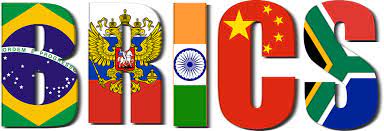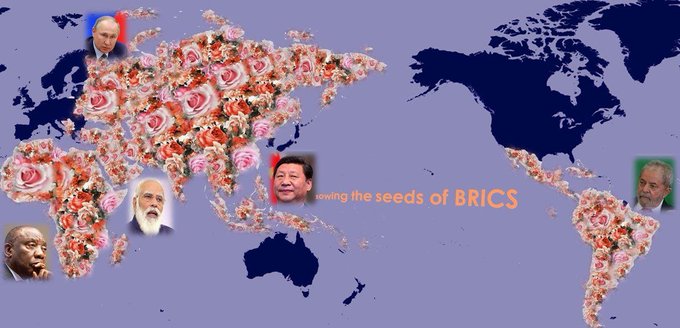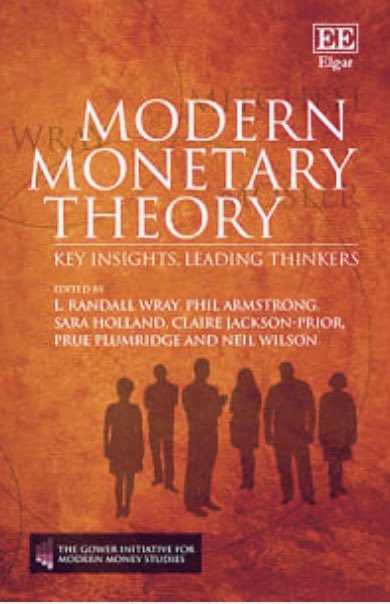Proxy war
Proxy war – a war instigated by a major power that does not itself participate
Ordezko gerlaz:
Oraingoa:
Errusia versus (Ukraina, AEB, EB, NATO)
Laster ikusiko duguna:
Txina versus (Taiwan, AEB, EB?, NATO)
Gerla horien atzean dagoena: sistema multipolarra versus sistema unipolarra
BRICS

The seeds of BRICS
Learn #MMT
Sarrera orokorra
Modern Monetary Theory
(https://www.e-elgar.com/shop/gbp/modern-monetary-theory-9781802208085.html
Edited by L. Randall Wray, Senior Scholar, Levy Economics Institute, Professor of Economics, Bard College, US, Phil Armstrong, York College, UK, Sara Holland, Founder, Claire Jackson-Prior, Founder, Prue Plumridge, Founder and Neil Wilson, Associate, The Gower Initiative for Modern Money Studies, UK
Publication Date: 2023
Contributors:
Phil Armstrong, Andrew Berkeley, Deborah Harrington, John T. Harvey, Sara Holland, Claire Jackson-Prior, Daniel Kostzer, Stuart Medina Miltimore, William Mitchell, Jamie Morgan, Warren Mosler, Yeva Nersisyan, Jessica Ormerod, Prue Plumridge, Pavlina Tcherneva, Richard Tye, Neil Wilson, L. Randall Wray
Contents:
Preface xiii
Phil Armstrong
Introduction to Modern Monetary Theory: Key Insights, Leading
Thinkers xvii
Sara Holland, Claire Jackson-Prior and Prue Plumridge
1 How does the government spend? A functional model of
the UK Exchequer 1
Andrew Berkeley, Richard Tye and Neil Wilson
2 Credit and the Exchequer since the Restoration 41
Richard Tye
3 Sovereign nations face resource constraints, not financial
constraints 67
Yeva Nersisyan and L. Randall Wray
4 A framework for the analysis of the price level and inflation 87
Warren Mosler
5 The external economy 94
William Mitchell
6 Modern Monetary Theory, the United Kingdom and
pound sterling 125
John T. Harvey
7 The Eurozone and Brexit 152
Stuart Medina Miltimore and William Mitchell
8 Modern Monetary Theory as post-neoliberal economics:
the role ofmethodology-philosophy 182
Phil Armstrong and Jamie Morgan
9 Tax as a hygiene factor: setting UK taxation policy using
Modern Monetary Theory 207
Neil Wilson
10 Checklist of an employment guarantee programme: the
Plan Jefes de Hogar from Argentina revisited 20 years later 226
Daniel Kostzer
11 Three lessons from government spending and the postpandemic
recovery 253
Pavlina R. Tcherneva
12 MMT and public policy in the United Kingdom 263
Deborah Harrington and Jessica Ormerod
Postscript: thoughts on MMT’s insights 289
L. Randall Wray
Index
(https://gimms.org.uk/2023/01/21/modern-monetary-theory/)
We wanted this book to answer the criticisms we most often hear when discussing MMT with members of the public generally and also with those who have a background in economics. Arguments such as MMT only being relevant to the US, the idea that MMT-inspired policies would be inflationary or that the UK risked suffering the same problems as Greece if the government had not implemented austerity policies after the Global Financial Crisis. We feel that it is important to answer such critiques because the views held by mainstream economists and repeated by politicians and journalists leave our society stuck where we are, with poverty commonplace, housing for many being expensive and of poor quality, public services being privatized and hollowed out and jobs being poorly paid and becoming less secure. Such views also keep the Global South trapped in a cycle of poverty, resource extraction and foreign currency debt. The subjects of the individual chapters were selected with these points in mind; however, all the chapters are the views of the authors, and each author has their own perspective within a broad MMT framework.
In chapter 1, “How does the government spend? A functional model of the UK Exchequer” Andrew Berkeley, Richard Tye and Neil Wilson show the means by which the UK government spends. This is an extremely important piece of work and is groundbreaking in its depth and scope. The authors draw on historical sources, testimonies from government departments, official documentation and parliamentary abstracts, forensically disassembling the components of the UK government’s finances, debunking ideology and half-truths along the way. This is a Wizard of Oz moment, the pulling back of the curtain to reveal the myths and obfuscation that has enabled decades of needless austerity to wreck the lives of millions in the UK and around the world.
Chapter 2, “Credit and the Exchequer since the Restoration” by Richard Tye explores the history of ‘money’ both English, then British, to show what insights this history gives on our financial system as it is today. He then argues that today’s exchequer is in need of reform and that many of its departments should be eliminated as they are unnecessary, given that they are composed of layer upon layer of conventions that have conspired to create a complex web preventing the type of transparency necessary in a functioning democracy.
In Chapter 3, “Sovereign nations face resource constraints, not financial constraints” Yeva Nersisyan and L. Randall Wray show how MMT builds on the Chartalist approach to money and how the constraints on spending in government are often self-imposed, and that the insights of MMT apply to many countries, not just those who issue reserve currencies. They explore the relevance of MMT to developing countries and discuss why the popular belief that it does not apply in these nations is detrimental to those countries.
Chapter 4, “A framework for the analysis of the price level and inflation” is by Warren Mosler, one of the founders of MMT. He delivers one of MMT’s key insights “a unique understanding of inflation” in direct contrast to the frequent accusations that MMT economists ignore inflation. Mosler shows how a currency-issuing government creates a demand for its currency by imposing a tax liability and that the price level is dictated by the prices paid by government when it spends, not by the total amount of money that the government spends.
In chapter 5, “The external economy” MMT’s principal developer, William Mitchell, explains how the ending of the Bretton Woods system changed the constraints on government spending from financial to real resource ones instead. Mitchell also explains the key MMT insight ignored by other schools of economic thought, that at a macroeconomic level, exports are a real cost to a nation, and imports in real terms are a benefit. The erroneous belief that our exports are a benefit to the nation has enabled generations of political lobbying by exporters to put downward pressure on domestic wages and living standards. This, again, is in contrast to the orthodox narrative which sees exports as a policy target because they provide income to nations, rather than a balanced economy that focuses on strategic self-sufficiency.
In chapter 6, “Modern Monetary Theory, the United Kingdom and pound sterling“John T Harvey addresses the argument that MMT-inspired policies will cause the currency to collapse. He shows how the MMT-as-currency-killer argument is based on models and assumptions that are at odds with reality as well as misrepresenting MMT. Harvey presents a realistic model that shows that MMT-informed policies would not cause a currency collapse, nor would high inflation or stagflation be the result.
Chapter 7, “The Eurozone and Brexit” by William Mitchell and Stuart Medina Miltimore, examines the European Union and the Euro currency. They argue that the diversity of the nations in the Eurozone and the lack of a fiscal union make it unlikely that the Euro will be successful in the long-term, and that nations will more than likely exit the union.
In chapter 8, “Modern Monetary Theory as post-neoliberal economics: the role of methodology-philosophy” Phil Armstrong and Jamie Morgan show how methodology and philosophy support MMT within broader heterodoxy and argue that MMT is a variant of open systems theory. They show that MMT economists understand that institutions that are made by humans can be directed by humans for better or for worse, and that in the light of the climate crisis, care is needed to direct these institutions wisely.
Chapter 9, “Tax as a hygiene factor: setting UK taxation policy using Modern Monetary Theory” by Neil Wilson, explains the vital importance of taxation and that, contrary to the belief of many economists, MMT does not ignore it. He then presents his view on what is needed in an effective tax system and his own proposals for a new system for the UK that makes use of existing state structures to simplify taxation whilst driving the currency and releasing the resources needed by the public sector.
In chapter 10, “Checklist of an employment guarantee programme: the Plan Jefes de Hogar from Argentina revisited 20 years later” Daniel Kostzer examines the Jefes Plan, an employment guarantee initiative which ran in Argentina until 2009 and had begun as a response to the financial crisis of 2001 there. Kostzer describes the programme and explores what the experience of Argentina can teach us about the options for a Public Employment Programme, including the Job Guarantee.
Chapter 11, “Three lessons from government spending and the postpandemic recovery” by Pavlina R. Tcherneva, explores the lessons that can be learned from the response of governments to the Covid-19 pandemic. She shows how the response corroborated key MMT insights about money, employment and inflation and argues that these lessons should be heeded in the future to improve public health, reach and maintain full employment, control inflation and protect the environment.
Chapter 12, “MMT and public policy in the United Kingdom” sees Deborah Harrington and Jessica Ormerod use the MMT lens to examine the crucial role of the State in provisioning itself with the real resources necessary to meet its public purposes mandate. They examine the history of government investment in infrastructure and public services, their subsequent neglect, and the privatisation models which have in recent years failed to meet the needs of the population and have left millions lacking in decent housing, healthcare, and the skills necessary both for now and to pass on to future generations.
The book concludes with a postscript by L. Randall Wray, in which he gives his “thoughts on MMT’s insights”.
oooooo
Sarrera
INDEPENDENTZIA: ikus INDEPENDENTZIA!
EUROPA: ikus Gaur egungo aukerak Europan
(Segituko du)






